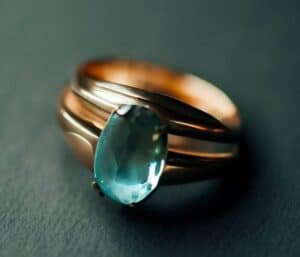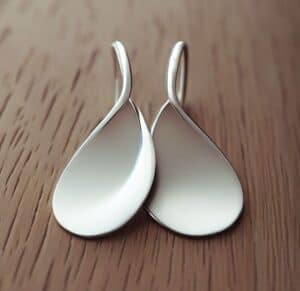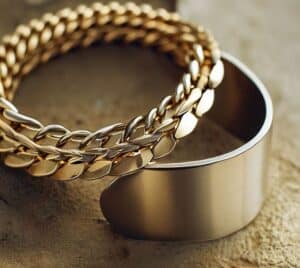Jewel
Jewelry is a piece of personal adornment used to beautify and enhance a person's appearance. Jewelry is made from precious materials such as gold, silver, platinum, and decorated with gemstones and semi-precious stones like diamonds, rubies, sapphires, pearls, among others.
Jewelry can be designed to be worn on different parts of the body, such as the neck, ears, hands, wrists, ankles, among others. Some of the most common types of jewelry include rings, earrings, bracelets, necklaces, brooches, pendants, and watches.
Jewelry is often considered valuable and can be used as a symbol of status, wealth, love, or commitment. Besides being used as personal adornments, jewelry can also hold sentimental or cultural value for the person wearing it.
In the jewelry industry, jewelry is created by designers and artisans who use different techniques and tools to produce unique and high-quality pieces. Jewelry can be sold in specialized jewelry stores or online, and its price can vary depending on the quality of materials, design, and brand.
How to choose a jewelry
Choosing jewelry can be a personal and emotional decision. Here are some factors to consider when selecting jewelry:
- Personal Style: Consider your own style and preferences. Do you prefer modern, classic, extravagant, or minimalist pieces? Choose jewelry that reflects your style and personality.
- Occasion: Think about when and where you plan to wear the jewelry. Is it for daily use, a special occasion, or as a gift? Consider the appropriate type of jewelry for the occasion, such as a ring, necklace, earrings, or bracelet.
- Material: Decide on the material you prefer for your jewelry. You can choose from precious metals like gold, silver, platinum, or even non-metal materials like leather or fabric. Also, consider whether you want gemstones or precious stones embedded in the jewelry.
- Quality: Ensure you choose a jewelry of good quality. Research the reputation of the manufacturer or seller and check if they offer warranties or certificates of authenticity.
- Budget: Set a budget before starting your search and adjust your options accordingly. Keep in mind that the price may vary depending on the type of jewelry, material, and quality.
- Comfort and Durability: Consider the comfort of wearing the jewelry and make sure it is durable. Pay attention to the quality of construction, clasps, settings, and other details that may affect durability and comfort.
- Sentimental Value: When choosing jewelry, consider the sentimental value it may have. Some jewelry pieces have special meaning, such as family heirlooms or sentimental gifts.
- Examine and Try On: Before making a final decision, examine the jewelry closely and try it on if possible. Observe the details, the quality of materials, and how it feels when wearing it.
Remember that when choosing jewelry, the most important thing is that it makes you feel special and reflects your style and personality.
Jewelry beyond an Adornment
Jewelry can have a deeper meaning and value than just being an adornment. Jewelry has been appreciated and used by various cultures throughout history for various reasons beyond aesthetics. Here are some additional aspects about jewelry that might interest you:
- Cultural Symbolism: Jewelry often carries cultural symbolism and can represent status, wealth, belonging to a specific community, or specific traditions. For example, engagement rings and wedding bands symbolize love and commitment in many cultures.
- Family Heritage: Jewelry can also be passed down from generation to generation, becoming symbols of family history and emotional ties. These heirloom pieces can hold immeasurable sentimental value and be considered family treasures.
- Protection and Charms: In some cultures, certain jewelry is believed to have protective powers or bring good luck. Charms and talismans, such as crosses, pendants, or specific gemstones, are often worn as jewelry to attract positive energy or ward off negative energy.
- Personal Expression: Many people use jewelry as a way to express their personal style, tastes, and preferences. Jewelry can be a form of self-expression, allowing someone to stand out, enhance their beauty, and show their individuality.
- Investment and Value: Some jewelry, especially those containing high-quality precious metals and gemstones, can be considered investments. Their value may increase over time, turning them into financial assets.
Each piece of jewelry tells its own story and can carry profound meanings for its owner.


Sandra Sanchez
Sandra is passionate about jewelry and interior design. She graduated in interior design from Universidad Taller 5 in Colombia and has completed several courses and postgraduate studies in Jewelry in Barcelona and Madrid, Spain. She combines her work as a jeweler and interior designer with teaching.


